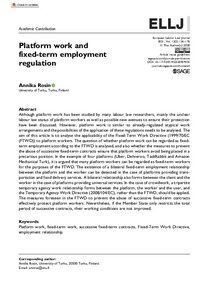Platform work and fixed-term employment regulation
Rosin Annika
https://urn.fi/URN:NBN:fi-fe2022081154978
Tiivistelmä
Although platform work has been studied by many labour law researchers, mainly the unclear labour law status of platform workers as well as possible new avenues to ensure their protection have been discussed. However, platform work is similar to already-regulated atypical work arrangements and the possibilities of the application of these regulations needs to be analysed. The aim of this article is to analyse the applicability of the Fixed-Term Work Directive (1999/70/EC (FTWD)) to platform workers. The question of whether platform work can be regarded as fixed-term employment according to the FTWD is analysed, and also whether the measures to prevent the abuse of successive fixed-term contracts ensure that platform workers avoid being placed in a precarious position. In the example of four platforms (Uber, Deliveroo, TaskRabbit and Amazon Mechanical Turk), it is argued that many platform workers can be regarded as fixed-term workers for the purposes of the FTWD. The existence of a bilateral fixed-term employment relationship between the platform and the worker can be detected in the case of platforms providing transportation and food delivery services. A bilateral relationship also forms between the client and the worker in the case of platforms providing universal services. In the case of crowdwork, a tripartite temporary agency work relationship forms between the platform, the worker and the user, and the Temporary Agency Work Directive (2008/104/EC), rather than the FTWD, should be applied. The measures foreseen in the FTWD to prevent the abuse of successive fixed-term contracts effectively protect platform workers. Nevertheless, if the Member State only restricts the total period of successive contracts, their working conditions are not improved.
Kokoelmat
- Rinnakkaistallenteet [29255]
